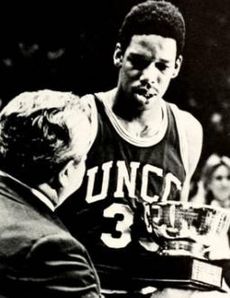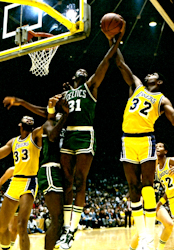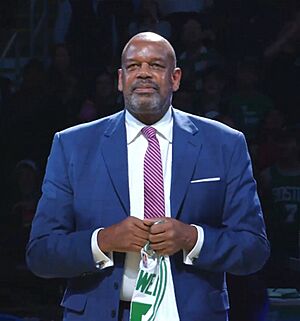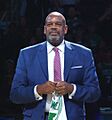Cedric Maxwell facts for kids
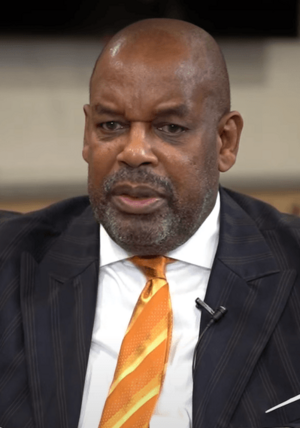
Maxwell in 2022
|
|
| Personal information | |
|---|---|
| Born | November 21, 1955 Kinston, North Carolina, U.S. |
| High school | Kinston (Kinston, North Carolina) |
| Listed height | 6 ft 8 in (2.03 m) |
| Listed weight | 205 lb (93 kg) |
| Career information | |
| College | Charlotte (1973–1977) |
| NBA Draft | 1977 / Round: 1 / Pick: 12th overall |
| Selected by the Boston Celtics | |
| Pro career | 1977–1988 |
| Career history | |
| As player: | |
| 1977–1985 | Boston Celtics |
| 1985–1987 | Los Angeles Clippers |
| 1987–1988 | Houston Rockets |
| As coach: | |
| 1996 | Long Island Surf |
| Career highlights and awards | |
|
|
| Career statistics | |
| Points | 10,465 (12.5 ppg) |
| Rebounds | 5,261 (6.3 rpg) |
| Assists | 1,862 (2.2 apg) |
Cedric Bryan Maxwell (born November 21, 1955) is a former American professional basketball player. He is now a radio broadcaster. People often called him "Cornbread". He played 11 seasons in the National Basketball Association (NBA). He was a very important player in helping the Boston Celtics win two championships.
After playing college basketball, he led the UNC Charlotte 49ers to the NCAA Final Four in 1977. The Boston Celtics then chose him in the NBA draft. In his second year, he became a starting player. The Celtics team was not doing well that year, but Cedric Maxwell was a bright spot.
The next year, Larry Bird joined the Celtics. This started a big comeback for the team. They became one of the best teams in the 1980s. In the 1980–1981 season, Robert Parish and Kevin McHale joined Maxwell and Bird. That year, the team won the NBA championship. Cedric Maxwell was named the Finals MVP.
Playing Basketball in College
Cedric Maxwell was a star forward and center for the UNC Charlotte 49ers. He is ranked sixth in points scored for the 49ers. His jersey number 33 was retired in 1977. This happened after he led UNC Charlotte to the NCAA Final Four tournament.
After his college career, the Boston Celtics picked him as the 12th player in the 1977 NBA draft. He played for the Celtics for eight of his eleven professional seasons.
Playing Basketball as a Pro
Maxwell quickly made a big impact with the Celtics. In his second season (1978–79), he scored about 19 points and grabbed almost 10 rebounds per game. Even though the team didn't win many games that year, Maxwell's strong play showed he had great potential. This set the stage for the Celtics to become a very successful team.
Maxwell was known for his clever moves close to the basket. He was good at tricking defenders. He would often get them to jump, then make a shot or draw a foul. He rarely took long shots. This helped the Celtics have a balanced offense. It made them hard for other teams to guard.
Cedric Maxwell was also a great player in important playoff games. He was named the MVP of the 1981 NBA Finals. Three years later, he scored 24 points in the final game of the 1984 NBA Finals against the Los Angeles Lakers. Before that game, he famously told his teammates, "climb on my back, boys." He also liked to joke around during games.
After an injury, Maxwell lost his starting spot to Kevin McHale. McHale had been a strong player coming off the bench.
On September 6, 1985, Maxwell was traded to the Los Angeles Clippers. This trade brought Bill Walton to the Celtics. Maxwell played for the Clippers for about a season and a half. Then, in January 1987, he was traded to the Houston Rockets. He finished his career with the Rockets after the 1987–88 season. He scored over 10,000 points and grabbed over 5,000 rebounds in his career.
Life After the NBA
The Celtics honored Cedric Maxwell by retiring his jersey number 31 on December 15, 2003. This means no other Celtics player will wear that number. He now works as a radio broadcaster for WBZ-FM in Boston. He has been announcing Boston Celtics games since 2001.
In 2007, Maxwell made a comment on the air about a referee that caused some discussion. He later apologized for his remarks during a broadcast. In 2013, he started co-hosting a new show called Celtics Summer Cooler. This show gives updates on the Celtics during the off-season.
How He Got His Nickname
Cedric Maxwell got his nickname "Cornbread" from his college teammate, Melvin Watkins. They went to see a movie called Cornbread, Earl and Me. In the movie, a young boy is sad after his friend, a basketball star, is killed. Watkins thought Maxwell looked like the main character.
Maxwell didn't like the nickname at first. But it became popular when he was named MVP of the 1976 National Invitation Tournament (NIT). The New York media started using the nickname, and it stuck.
Images for kids
See also
 In Spanish: Cedric Maxwell para niños
In Spanish: Cedric Maxwell para niños
 | Precious Adams |
 | Lauren Anderson |
 | Janet Collins |


